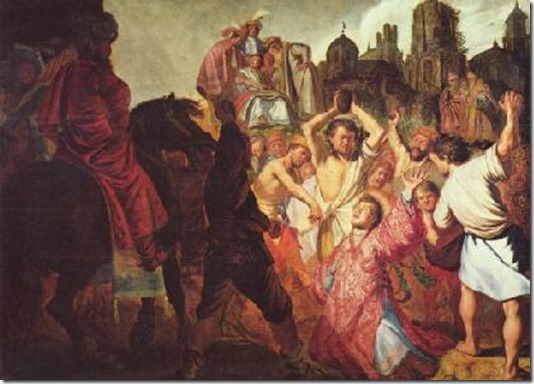
What It Means to be Persecuted Like the Prophets
“Blessed are you when people revile you and persecute you and utter all kinds of evil against you falsely on my account. Rejoice and be glad, for your reward is great in heaven, for in the same way they persecuted the prophets who were before you.” (Matthew 5:11-12)
I’ll start with something obvious: sometimes Christians act badly. Can we just admit this? In the history of the church, along with many, many good things you will also find anti-Semitism, torture, witch-hunts, slavery, apartheid, misogyny, and other things over which we now blush. Most of us, anyway.
Remember, however, that all of these things were done in the name of Christ.
And we didn’t give up any of them without a fight. Sometimes the opposition came from without and sometimes from within, but it came, as it should have, and many Christians hunkered down and fought—often literally—until they were finally overcome.
And as they were being overcome, all of them felt persecuted, and they comforted themselves with the thought that they were being like the prophets.
But the presence of persecution does not mean a person is being prophetic. Sometimes it means that on any particular issue people who are Christians can be less righteous than those who aren’t.
The reason the prophets were persecuted is that they were willing to speak truth to power when power was abusing those who couldn’t defend themselves. The prophets gave voice to the voiceless, they stood up for those who couldn’t stand up for themselves, they put up resistance on behalf of those who had been beaten down and couldn’t resist any longer.
This is what Jesus did, which is why he is called a prophet, and why Jesus linked persecution “on my account” with that of the prophets.
It’s actually amazing that the Prophetic books made it into the Bible, because they represent a minority voice, a voice that went unheeded. Take the book of Jonah, for instance. Jonah advocates for an expansive view of God’s love and mercy, one that included Gentiles, one that would even include Israel’s enemies.
That is not the view that prevailed in Israel, which was one of separation and exclusion, of the annihilation or at least complete submission of Israel’s enemies, of closing ranks and protecting Israel from the immoral and unclean people that surrounded them.
That’s the view that is in power when Jesus came along. It’s the one that he spoke against when he gave the Beatitudes, that he stood against when he ate with Sinners, and that he confronted when he came to Jerusalem and cleansed the Temple.
It’s the view that crucified him.
The Prophets represent the literature of the losers, and if history is written by the winners, the literature of the losers is generally lost in the dust of history.
But not in our Bible. In Scripture the losers are given a voice, and that voice is given a name that is above all names.
There are those who care more for getting more of what they already have than for making sure that everyone has enough of what they need. There are those who feel that to give someone else their rights means sacrificing some of their own. There are those who are willing to sacrifice nothing of themselves but much of someone else.
When Christians speak up, speak out, and speak against them, these are the ones who have the means and the will to make our lives difficult if not miserable.
But anti-Semitism, torture, witch-hunts, slavery, apartheid, misogyny, etc. weren’t given up easily. It took people willing to stand up and speak out, to confront the powerful, and then be reviled, persecuted, and slandered—all on account of the prophetic Lord.
These are the ones Jesus called blessed.
Image Credit: The Rembrandt Database, Object information, Rembrandt, The stoning of Saint Stephen, dated 1625, Musée des Beaux-Arts de Lyon, Lyon, inv. no. A 2735, http://www.rembrandtdatabase.org/Rembrandt/painting/8294/the-stoning-of-saint-stephen, accessed 2016 April 13

 I am a lifelong student of the Bible, and have been a pastor for over twenty-five years. My desire through this blog is to help people see things in the intersection of Scripture and real life that they might have missed. The careless handling of the Bible is causing a lot of problems in our churches and our culture--and is literally turning people away from the church, and, sometimes, God. I hope to treat Scripture with the respect it deserves, and, even if you don't agree with what I say, give you some insight.
Feel free to leave a comment. I promise to respond to you. All I ask is that you be respectful in your comments.
I am a lifelong student of the Bible, and have been a pastor for over twenty-five years. My desire through this blog is to help people see things in the intersection of Scripture and real life that they might have missed. The careless handling of the Bible is causing a lot of problems in our churches and our culture--and is literally turning people away from the church, and, sometimes, God. I hope to treat Scripture with the respect it deserves, and, even if you don't agree with what I say, give you some insight.
Feel free to leave a comment. I promise to respond to you. All I ask is that you be respectful in your comments. 
Connect with Me